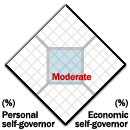More Gore
What a lot of bunk.
Those "hundreds of millions" of "climate refugees" are supposed to be the result of massive rises in sea level. Al Gore's film talks about sea level rises of “18 to 20 feet,” partly as a result of "possible" melting of the Greenland ice sheet. The Skeptics' Guide to An Inconvenient Truth conveniently rebuffs these two related myths.
Sea Level Rise. The United Nations Intergovernmental Panel on Climate Change does not forecast sea-level rises of “18 to 20 feet.” Rather, it says, “We project a sea level rise of 0.09 to 0.88 m for 1990 to 2100, with a central value of 0.48 m. The central value gives an average rate of 2.2 to 4.4 times the rate over the 20th century...It is now widely agreed that major loss of grounded ice and accelerated sea level rise are very unlikely during the 21st century.” Al Gore’s suggestions of much more are therefore extremely alarmist.Read on here for the top 25 one-sided, speculative, misleading and just plain wrong pieces of "evidence" peddled in Al Gore's film, and here (if you haven't already downloaded it) for the full 120-page Skeptics' Guide [PDF]. Given that both National and now Labour have been pushing the bloody film in recent weeks as an excuse to outbid each other in meddling promises of environmentally-motivated authoritarian action, it would seem that a passing acquaintance with its full shallowness is to be necessary self-defence for freedom-lovers in coming months.
Greenland Climate. Greenland was warmer in the 1920s and 1930s than it is now. A recent study by Dr. Peter Chylek of the University of California, Riverside, addressed the question of whether man is directly responsible for recent warming: “An important question is to what extent can the current (1995-2005) temperature increase in Greenland coastal regions be interpreted as evidence of man-induced global warming? Although there has been a considerable temperature increase during the last decade (1995 to 2005) a similar increase and at a faster rate occurred during the early part of the 20th century (1920 to 1930) when carbon dioxide or other greenhouse gases could not be a cause. The Greenland warming of 1920 to 1930 demonstrates that a high concentration of carbon dioxide and other greenhouse gases is not a necessary condition for period of warming to arise. The observed 1995-2005 temperature increase seems to be within a natural variability of Greenland climate.” (Petr Chylek et al., Geophysical Research Letters, 13 June 2006.)
LINK: Al Gore to star at Kiwi summit - Sunday Star
Gorey Truths - Ian Murray, National Review
Skeptics' Guide to an Inconvenient Truth - Competitive Enterprise Institute [120-pge PDF]
Lots of climate change announcements - Not PC (Oct 6)
RELATED: Politics-NZ, Environment, Global Warming






































